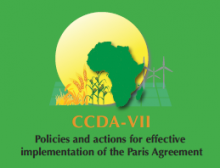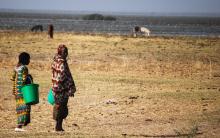Panelists and delegates agreed knowing the interconnectedness of issues related to water (SDG 6: Clean water and sanitation), food security (SDG 2: Zero hunger), and energy (SDG 7: Affordable and clean energy), for instance, to the NDCs and Agenda 2063, was essential to manage the continent’s environmental resources in an integrated way.
“Taking into account the interdependencies and interrelatedness of environmental resources, it is essential that we have efficient and cost-effective strategies through the nexus approach for achieving the SDGs and Africa’s Agenda 2063, the Africa we want, especially given the new dire IPCC climate,” said Economic Commission for Africa’s Nassirou Ba.
Mr. Ba, an Economic Affairs Officer with the ECA, and fellow panelists in a session discussing the nexus, agreed political will is what Africa needs if it is to achieve sustainable and equitable development and ensure it leaves no one behind as espoused by the landmark Agenda 2030 for Sustainable Development.










